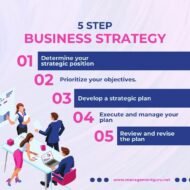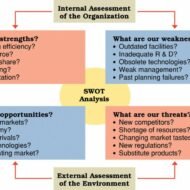Posted by Managementguru in Business Management, Decision Making, Financial Management, Marketing, Strategy
on Sep 29th, 2014 | 0 comments

What is meant by Mergers and Acquisitions? This is a general term used to refer to the #amalgamation of companies. A merger is a combination of two companies to form a new company, while an acquisition is the purchase of one company by another in which no new company is formed. Mergers and acquisitions refers to the buying, selling and combining of different companies to aid a company in a specific industry to grow quickly without having to create another business entity. Growth due to Internal and #External Expansion: A business might grow either by #internal expansion or by external expansion. In the case of internal expansion, a firm grows progressively through procurement of new #assets, substitution of the technologically out-dated equipments and the setting up of new product line. But in external expansion, a firm secures a running business and grows overnight through corporate combinations. These combinations are in the form of mergers, acquisitions, amalgamations and takeovers and have now become important features of #corporate restructuring. Why Mergers & Acquisitions: Mergers and acquisitions are strategic decisions taken for boosting up company’s growth by augmenting its production and marketing operations. One of the main reasons that companies opt for a merger or acquisition is that, by conjoining business undertakings, performance will increase and costs will decrease. Essentially, a business will attempt to merge with another business that has complementary #strengths and weaknesses. Many M&A deals allow the #bidder to thrash future competition and gain a larger market share in its product’s market. Mergers or amalgamations may take two forms:- #Merger through Absorption:- An absorption is a combination of two or more companies into an ‘existing company’. All companies except one lose their identity in such a merger. Example: 1999 merger of Glaxo Wellcome and SmithKline Beecham, both firms ceased to exist and a new firm GlaxoSmithKline was created. #Merger through Consolidation:– A consolidation is a combination of two or more companies into a ‘new company’. In this form of merger, all companies are legally dissolved and a new entity is created. Here, the acquired company transfers its assets, #liabilities and shares to the acquiring company for cash or exchange of shares. A fundamental characteristic of merger is that the acquiring company (existing or new) assumes the #ownership of other companies and combines their operations with its own operations. Reverse Merger Is a deal facilitating a private company to become a public company. The deal enables private company by listing in a short time period. Occurs when a private company has strong prospects and is eager to raise financing, buys a publicly listed shell company. Usually the public one is one with, no business and limited assets Acquisitions and Takeovers #Reverse Takeover Acquisition usually refers to purchase of smaller firm by larger firm Sometimes, smaller firm acquire #management control of a larger / longer established company Keep its name for combined entity Friendly Acquisition Companies accomodate in negotiations Identical to merger of equals Cognizant to Acquire TriZetto, creating a fully-integrated healthcare technology and operations leadership. With more than $3 billion in combined healthcare revenue, Cognizant and TriZetto will serve nearly 245,000 healthcare providers. Hostile Acquisition Takeover target reluctant to be purchased If the #acquiree company has no prior knowledge of offer Hostile takeovers do turn friendly most of the times. Offer is usually upgraded for smooth acquisitions Benefits of Mergers and Acquisitions Greater Value Generation Generate Cost Efficiency #Economies of Scale Increase in Market Share Gain higher...

Posted by Managementguru in Human Resource, Interview Questions, Strategy, Training & Development
on Jun 5th, 2014 | 0 comments

How do you answer “What is Your Greatest Weakness?” Job Interview Question or JIQ #2 “Our greatest weakness is that, We are unwilling to accept our weaknesses.” If you are subjected to this question in a job interview – “What is your greatest weakness?” what will be your response or reaction? You would have been bowled over by the time your brain scans for some reply (way-out) that would be appropriate. This kind of a question can potentially damage or salvage your job prospects – Yes! It solely depends on how honest you are in dealing with your own weaknesses or short comings and also how wisely you are able to turn it to your advantage. Your response tells the interviewer a lot about your uprightness, so it unquestionably holds a lot of weight.” “To err is human But to forgive is not in an interviewer’s agenda.” Never choose a weakness that indicates your inappropriateness for the job: “A salesman has to be good at communication” “An accountant needs to be good at calculations” “A teacher has to have a patient attitude to manage the students” Will you hire a person with quick temper for a customer relationship position? Will you hire somebody who lacks charisma to be a team-leader? Here, we are just not talking about the technical skills alone, but also about attitude and emotional traits of a person that define his/her personality. Remember that a weakness isn’t necessarily bad: So, the main idea of throwing this question in an interview is not to pull your legs down (though sometimes the interviewee falls a prey by his own naivety), but to gauge how well you can handle or had handled a pressure-situation in previous jobs. Try not to expose your personal weakness- If you say you can’t get up early in the morning, do you think your hiring manager will appreciate the idea? Try to rationalize how you transformed a weakness into strength by perception and perseverance in a purely job-related context. Don’t blurt stereo-type answers: Be direct in your approach and avoid stereo-type answers which will irritate the interviewers; I’m a perfectionist, I pay attention to detail, I never relax, I’m a workaholic- all these responses will sure-fire you from the prospective list. These are neither strengths nor weaknesses but only hypocritical projections of your “self.” These kind of compliments should come from people around you and sometimes it is funny how the greatest strength becomes the greatest weakness too. Do Your Homework Properly: Think about this, if you are a workaholic who spends 15 hours a day adding prosperity to the company, your boss might be happy, but will your wife and children be happy? I’m able to feel the heat from the women folk – the same applies to you too. Though the subject deviates to work-life balance, the undercurrent of the discussion is not to mention your weakness that is directly related to the job you are applying for. Do your homework properly by analyzing the job specification and description thoroughly and decide if you will fit the bill. Mention the areas you are trying to improve upon; you can very well say, “I’m trying to improve my prioritization skills which would help me to line up tasks and complete projects well within the time limit.” You can highlight how you were an introvert and how you have transformed yourself as a “people-person” by realizing that it is the order of the day to be successful in a professional environment. Avoid Rehearsed answers: “If you don’t know your weakness, take a personality type quiz and the results...

Posted by Managementguru in Business Management, International Business, Leadership, Marketing, Operations Management, Principles of Management, Sales, Strategy
on Mar 26th, 2014 | 0 comments

Some business firms with a modest and humble beginning make it to the top in a very short span of time. How do you think this is possible? They have a clear strategic vision that guarantees success. Success does not come that easy. You have to have real focus backed up by solid strategies for such resounding success. A strategy is a comprehensive plan of action that sets critical direction and guides the allocation of resources to achieve long-term organizational objectives. Some people formulate strategies and follow suit, some flow along with the stream of situations and react accordingly, rather than merely plotting strategies. Mere strategizing is not enough, you have to look into the actual situation and how it would affect your operations. Learn Sales Hacking Essential sales skills, sales strategies and sales techniques to sell just about anything! Let us have a clear understanding on the reasons for formulating a strategy Business has gone global for many reasons, including reactive ones like, international competition, customer demands and trade barriers, and proactive ones like seeking economies of scale, new international markets, resource access and cost savings. After the liberalization, globalization and privatization processes activated in full swing, many firms have come to the limelight in the international market scenario, which has provided them with a solid head start. Companies have to respond to both changes in the external environment and emerging opportunities. An opportunity not well utilized is an opportunity lost. Rational planning is called for to meet international expansion through workable strategies. International corporate strategy is purely based on the intentions of your firm, the objectives that stem out from your vision and can be materialized by scanning the environment for threats and opportunities, assessing the internal strengths and weaknesses of the firm, considering alternative international entry strategies and firming up on the workable ones. List down the answers to the following questions and you may arrive at a reasonable conclusion on your company’s market standing. Strengths What are your advantages?What is the activity that you specialize in?What is your uniqueness that differentiates you from your competitors? Your own viewpoint and that of the people you deal with is necessary. It is important to be honest and realistic. This exercise helps you and your team to understand the mission and purpose. Weaknesses What is done badly?What could be done better?What should be avoided?What causes problems or complaints? To identify the unpleasant truths as quick as possible is the notion of this exercise. Ascertain Your Priorities After ascertaining the priorities, the strategic management process is carried out with well laid plans, executed by professional strategists followed by implementation of control and evaluation procedures. Any corporate firms go for strategic alliances, that may include, acquisitions, mergers, joint ventures, strategic partnerships, cartel agreements and so on to survive in the international market as well as to exploit the opportunities available in the global market with the available potential resources put to optimal...

Posted by Managementguru in Business Management, Decision Making, Marketing, Organisational behaviour, Principles of Management, Project Management, Strategy
on Mar 22nd, 2014 | 0 comments

What is Swot Analysis and how to do a Swot Analysis Perfectly? Strategy formulation is an integral part of management decision making as strategies come to our risk whilst there are fluctuations in the external environment. A management expert will tell you rightly that strategies are not templates constructed for a specific purpose as they are formulated based on broad policies of a particular organization and have to be in tandem with the enterprise objectives. Nevertheless a CEO will find himself in situations where he might be forced to make instantaneous strategic decisions irrespective of the nature of the problem, only considering the magnitude of the situation. SWOT AND SYNERGY EQUATIONS Significance of SWOT Analysis: The analysis subjectively evaluates the impact of internal and external factors for a business objective. Internal processes and resources are considered strengths and weaknesses (S and W, respectively). External factors affecting the business and industry are considered opportunities and threats (O and T, respectively). An evaluation of these factors develops a strategic perspective that includes the competitive landscape and current market conditions. Need for Alternate Strategic Decisions: Lately we are witnessing a number of multinational giants going in for Joint Ventures and Collaboration. What is the root cause for such alternate strategic decisions? What happened to the value of the “Brand Image” of the organization or the “Profit Margins” which kept the company going? Well, this is where we have to look into the structure of their operations and most importantly the modality formulated to reach their ultimate objectives. Definitely, there would have been a big dent somewhere in the top management notch, failing to see through the obvious. Market Research is Inevitable for Decision Making: Situations change and we even experience this in our day to day lives, where decision making becomes very difficult at times; further we push the situation to extreme limits and make it worse. Planning is the very basis of our life that facilitates smooth functioning and change for the better. In big corporates, decision making is by and large the responsibility of the top management and they pass on the instructions down the line. It is but natural that the chairman and board of directors should make all the important decisions as they are the potential capital investors. Market research is another area that deserves mention at this juncture without which business persons cannot think of kicking off trade as it will be a sheer waste of money and time. Understanding the pulse of the market and your target customers always help in shaping up the right strategies concerning New product launch Consumer Preference Price determination Product modification etc., Test marketing is one of the strategies followed by many multi national companies while they launch their new products or wish to introduce variations in their product range. THE IMPORTANCE OF DECISION-MAKING Strategies are based on organizational policies and policies have to confer to the objectives and goals of the organization. The top management team should be a set of professional experts who should be able to gauge the existing as well as future trends of the market based on political, legal, environmental and economic changes and sketch their action plans accordingly. Decentralising decision making and delegating the authority as and when needed are also fine strategies to gain co-operation from your employees and to bring co-ordination in the entire business...








